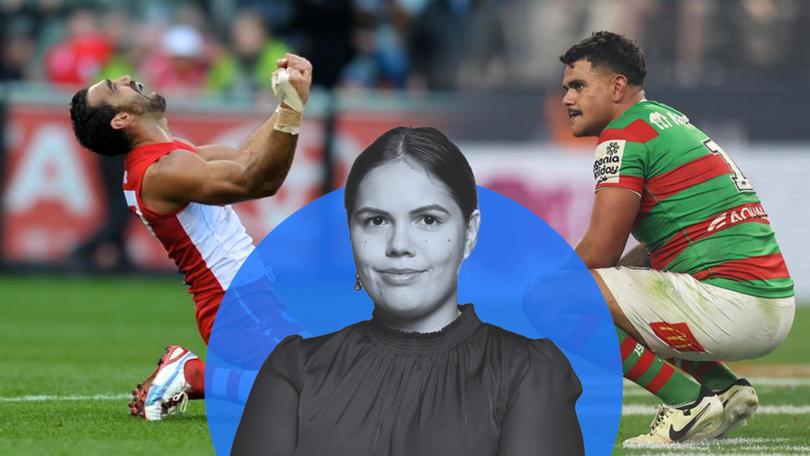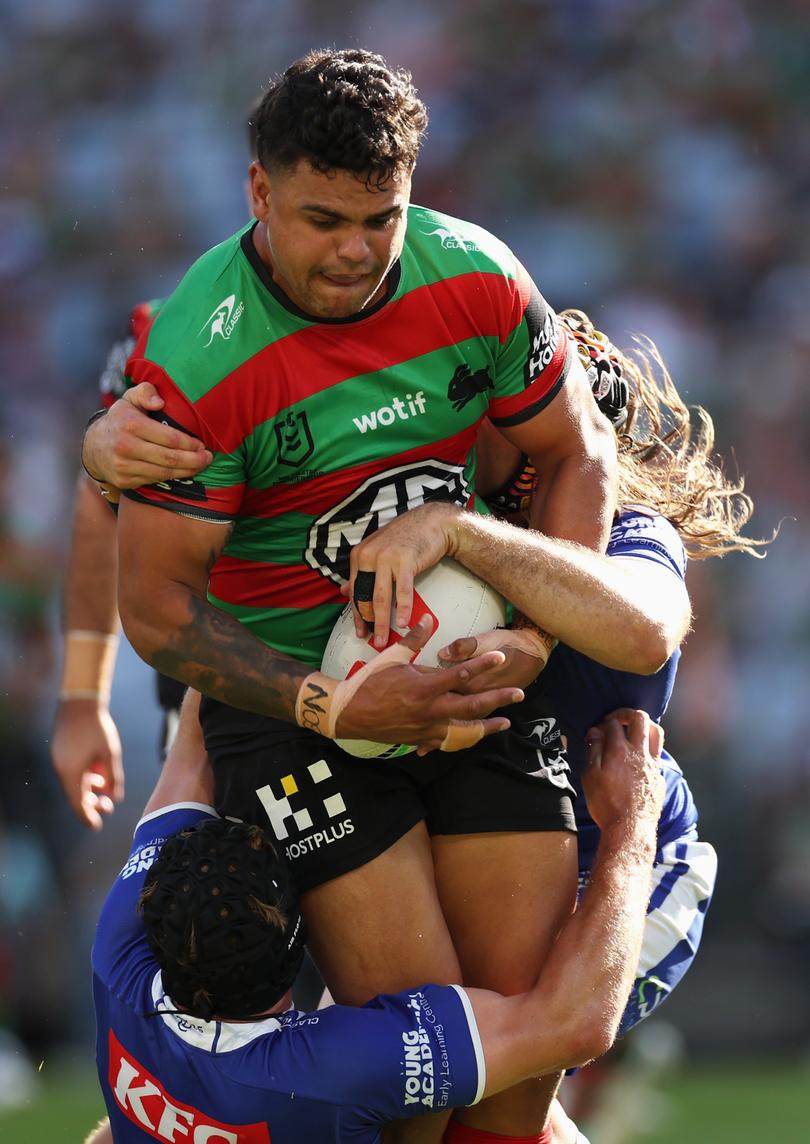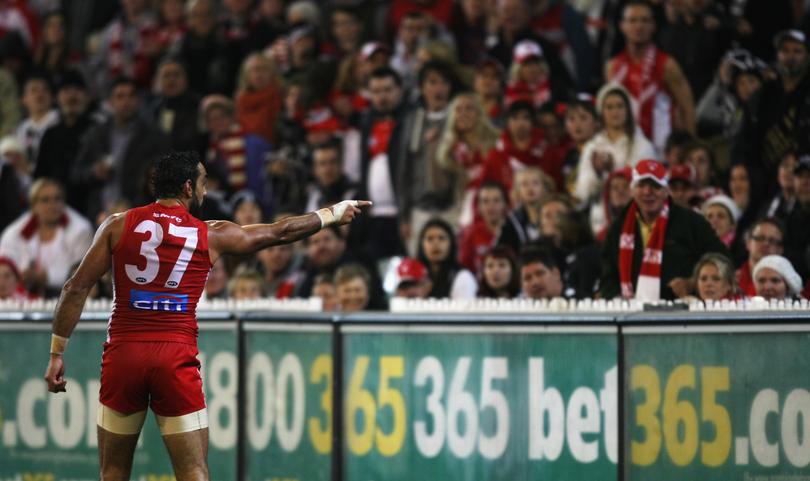EMMA GARLETT: The booing of South Sydney star Latrell Mitchell has the sinister feel of Adam Goodes saga
If I was booed every time I walked into the office, I’d want out. But Latrell Mitchell is facing this every time he takes the field and it has the sinister feel of the Adam Goodes racism saga.

If I was booed every time I walked into the office, I’d want out. Better yet, I’d want some form of compensation for the bullying and harassment I was subject to in the workplace as it is an unsafe place to work.
Booing isn’t accepted in the open-plan offices of corporate Australia, yet in sport it seems fans feel as if they have a “right to boo” as a condition of their ticket purchase.
The unanswered question remains as to whether booing towards Indigenous players is being used as a form of racism. If it is, then spectator racism is on the rise — and Australian sport is riddled with a history of ugly racism.
Sign up to The Nightly's newsletters.
Get the first look at the digital newspaper, curated daily stories and breaking headlines delivered to your inbox.
By continuing you agree to our Terms and Privacy Policy.The prominence of spectator racism has been investigated by the Australian Human Rights Commission, which published an evaluation report last year after reviewing sporting codes and professional sporting venues and their response to racism and racial discrimination.
South Sydney NRL star Latrell Mitchell is the latest outspoken Indigenous player to be inexplicably booed by spectators, during the Rabbitohs’ Good Friday win against the Bulldogs.
Every time he touched the ball in the second half, there it was.
A leading rugby league reporter in Sydney this week said the booing had now become “sinister and ominous” from a small section of fans.
As a high-profile player who regularly speaks up about racism and the challenges of racial inequality, Mitchell has borne the brunt of both being attacked and providing support for peers suffering racist attacks.
He was the first to vocally throw his support behind Ezra Mam after he was racially vilified by Roosters prop Spencer Leniu, who called the Broncos star a monkey.
Mitchell called for a harsh sanction against Leniu and when he was banned for eight weeks, Mitchell said that was not long enough.
For his social media posts and commentary on the issue he was widely criticised by league pundits, who argued Mitchell was given a wider licence than most players because of his status and that he received “special treatment”.
These criticisms have been called out as thinly veiled racism, but have also been seized on by keyboard warriors to put the boot into the 26-year-old.
His coach Jason Demetriou called out the critics and threw his support behind Mitchell when they called for the Souths star to be silenced despite Leniu pleading guilty. Demetriou said: “If you stand for nothing you fall for everything.”
This came as Roosters coach Trent Robinson was among leading voices to argue the monkey insult was not racist.
The Rabbitohs have a deep history with First Nations people, the club being based in Redfern which was a flourishing Aboriginal community and was home to more than 20,000 Aboriginal people in the late 1960s and early 1970s.
When sports stars are taking these incidents to social media, it is a cry for help and support. Mitchell’s impact on social media isn’t small and his comments get traction, with some 321,000 followers on Instagram.
In a recent Instagram post featuring Mitchell wearing a shirt emblazoned with an Aboriginal flag he addressed the importance and complexities of standing up to racism.
“Standing up for what you believe in is the hardest thing you could ever do, that’s why not everyone can do it. You will either be hated or loved for doing it. For me I know every time I open my mouth about something I’m passionate about I’m tested on it, I am judged on it regardless if it’s not what the public eye views,” he wrote, ending the post with an #IstandwithEzra hashtag.
This social media post alone shows his passion and dedication to speaking out, despite what others may believe.
Mitchell has not been afraid to speak without a filter. He came under more fire following the Mam backlash when he swore repeatedly during a post-match interview.
He met with NRL boss Andrew Abdo to talk about his behaviour and the expectations the league had for him as one of its highest profile players. Yet even this drew criticism and the “special treatment” argument was again trotted out.
But the NRL has so far been mute on the concerted booing campaign.
Combined with some questionable tactics he employs on the field and a belief among some fans and pundits that he is overrated — having last played for NSW in 2021 and with Souths coming off a poor 2023 season only to get worse this year — the issue seems to have come to an ugly head.

On the face of it we only see the Mitchell saga, but there is a darker, more ominous underlying issue at play.
In society we are encouraged that if we see something, say something. Yet in Australian sport, speaking out about racism seems taboo and criticised when players rear their heads to tackle the issue, and it always seems to make headlines about how “outspoken” a player is. But there is a fine line between sticking up for yourself and your mates, and ensuring you are a role model to young kids who look up to you.
The NRL is not alone in the racism department. Eddie Betts spoke about the racism he experienced every week of his career playing in the AFL, and just last week he shared footage of sickening insults being hurled at his children as they played basketball at the front of his family home.
First Nations people are constantly negatively racialised in all levels of Australian sport, from juniors through to the elite, and it is seen not just among the players, but with volunteers, fans, coaches and match officals.
Racism in Australian sport is not isolated to First Nations people, Priscilla Hon, a professional tennis player just outside the world’s top 150, said she can’t remember when she wasn’t racially abused.
Racial literacy among players and spectators is imperative. Racism exists in society and sport is a microcosm of Australian society, and those who think racism doesn’t exist should get their head out of the sand and stop being naive.
This is an opportunity to set the precedent of what is acceptable in society.
Data shows that 7.2 million Australians (33.5 per cent) support an NRL team. Rugby league’s reach is vast, the NRL has a responsibility and need to act so it doesn’t become the poster child for racism in sport.
Elite sport stars are role models, and their behaviour is watched and critiqued. But this racism isn’t happening in isolation, history tells us the extent of the problem and when the Human Rights Commission have stepped in, you start to understand the gravity of the situation.
Players need to be supported not silenced. They are seeing something and saying something. It would be amiss to walk by racist behaviours and not stand up for what is right.
The other key consideration is that when the players are on the field or off it, they are at work — they need a safe working environment that is free from racial abuse. Whether they are playing or on the sidelines shouldn’t matter.
This behaviour is being called out and I am hopeful that sports fans are not racist, of course there may be a small group who are, but it is not everyone.
However, the small minority need to understand that what may have been ignored in the past will not be ignored today, racist behaviours are being highlighted and addressed.

This situation feels all too similar to the Adam Goodes saga. He was forced into early retirement because of racism. He was relentlessly being booed. All because he called out a young female fan who, like in the Mam incident, called him a monkey
The AFL promised to learn from this experience as it failed to support him adequately in the face of the abuse, outlining this should have been dealt with sooner.
The NRL needs to do something pronto, how long does it take to learn from the experience of the AFL? The players are defending their peers, and this is a cry for help and action at a club and institutional level.
This is a chance for the NRL to be on the right side of history. The AFL said it was too slow — will the NRL be faster?
Currently, the Australian Human Rights Commission has a Guide to Addressing Spectator Racism in Sport and resources accompanying it, but despite the plethora of documents we are still seeing the prominence and impact of racism in the games we love and not enough being done about it.
There is a clear need to be proactive in addressing racism which is grounded in understanding structural, institutional and systemic racism, its indicators, and outcomes. All stakeholders need to act, including the players, players associations, codes, clubs, sporting associations, venues and especially the fans themselves.
The NRL must act and learn from the mistakes of the AFL.
Emma Garlett is a Indigenous legal academic who works towards reconciliation and justice for Indigenous people. She is also the host of Paint It Blak — a YouTube channel that takes an indigenous lens to news, entertainment and social affairs.
